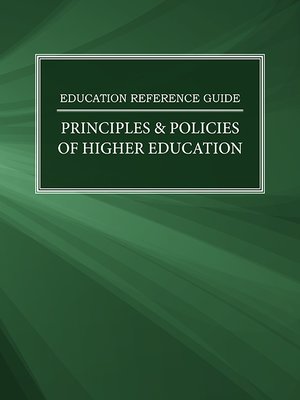Education Reference Guide: Principles & Policies of Higher Education
ebook
By The Editors of Salem Press

Sign up to save your library
With an OverDrive account, you can save your favorite libraries for at-a-glance information about availability. Find out more about OverDrive accounts.
Find this title in Libby, the library reading app by OverDrive.



Search for a digital library with this title
Title found at these libraries:
| Library Name | Distance |
|---|---|
| Loading... |
The collection begins with Sinclair Nicholas’s examination of the “publish or perish” system, which is often considered
“the key to higher education career advancement.” Nicholas reviews the current state of the academic publishing
industry and the trends that may be related to the decreasing number of tenured positions at large research universities.
Karin Carter-Smith then looks at institutional effectiveness in higher education, a decision-making model through
which an organization measures its performance and evaluates its mission and goals. This model can have a serious
impact on the accountability, performance, and funding of colleges and universities. Cynthia Vejar directs the
conversation to the Generation Y student demographic and the educational and parental influences that have fostered
their “manifestation of adult characteristics such as narcissism, multitasking, open-mindedness, and technological
expertise.” Although there are many unique generations of students in the twentieth century, studies have shown that
the rate of academic dishonesty in colleges and universities has increased for current age groups like Generation Y. As
Maureen McMahon clarifies, the behavior is often reinforced when professors and administrators do not have consistent
policies that punish students for cheating or plagiarism. Ruth A. Wienclaw then switches gears with an essay on
the evolution of college business programs, which have turned from trade schools to research-oriented departments.
While there are many criticisms that argue this approach ill-prepares students for leadership and success, Wienclaw
defends these programs and their numerous efforts to increase the emphasis on having students acquire practical skills
and gain hands-on experience.







